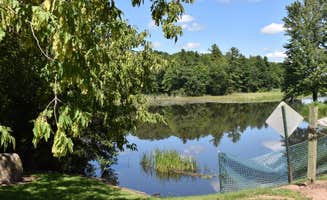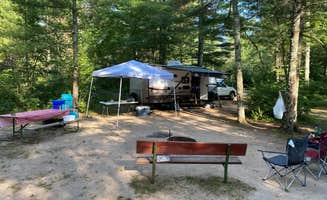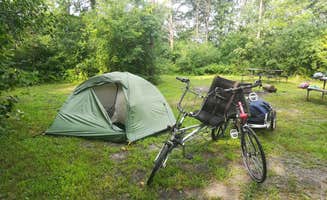Tent camping options near Pittsville, Wisconsin cluster mainly in the central and western regions of the state where dense forests meet waterways. Most campgrounds in this area range between 800-1,000 feet in elevation, creating moderate temperature variations between day and night. Summer nighttime temperatures can drop into the 50s even when daytime highs reach the 80s, making proper sleeping gear essential for tent campers.
What to do
Paddle non-motorized waters: Coon Fork Campground maintains a motorized craft restriction on its lake. "No outboard motors allowed on this lake. Canoe and rowboat rentals are available at the office," notes camper Brook. The rental options make water recreation accessible without hauling personal equipment.
Explore biking trails: The camping areas surrounding Pittsville provide access to extensive biking networks. At Sparta Campground, camper Jamee notes it's "right on the Elroy-Sparta trail and only a 10 minute bike ride into the town of Sparta." This makes it convenient for cyclists looking to access services while touring the trail system.
Scuba dive inland lakes: Central Wisconsin offers uncommon inland scuba diving opportunities in former quarry sites. Many tent campers combine their stay with underwater exploration, as the region's mining history has created uniquely deep, clear lakes suitable for diving training and recreation.
What campers like
Child-friendly environments: Family campers consistently praise the accommodations for younger visitors. At Coon Fork Campground, Hannah reports it's "Great for kids! Way more fun later in the summer so you can go swimming. Although, children don't seem to notice cold water anyway!" The campground maintains playground facilities and enforces quiet hours.
Site spacing and privacy: The generous spacing between sites receives frequent positive mentions. Amy notes about Coon Fork: "The sites are very generous with a lot of green between spaces. You are not on top of your neighbor." This layout allows for a more private experience compared to densely packed commercial campgrounds.
Fishing access: Trout fishing opportunities attract many tent campers to the area. At Wazee Lake Rec Area, Luc reports "the water is so clear, the trout fishing is great and so is the beach!" The combination of fishing access with swimming beaches creates versatile recreation options.
What you should know
Highway noise factors: Interstate proximity affects several campgrounds in the region. At Sparta Campground, Theresa reports: "The site is close to I90 so traffic noise is great, particularly during the week. Our first night was a Thursday and truck traffic was loud all night, our return stay was a Saturday and traffic noise was considerable less." Weeknight stays may require noise mitigation planning.
Limited facilities: Many sites offer only basic amenities. The Canoe Campsite Near Hawk Island provides extremely basic accommodations. Brian describes it as having "No water, no facilities. Just two fire rings and two picnic tables about 100 ft apart. But the grass is mowed and well kept." Campers need to pack all necessities.
Non-resident pricing: Wisconsin state parks and some county facilities charge differential rates for out-of-state visitors. Mike observed at Sparta Campground: "Non-resident upcharge ($30 vs. $15 plus fees). Sites are basic with water, pit toilets, tables and fire rings." This price differential can significantly impact trip budgeting for non-Wisconsin residents.
Tips for camping with families
Enforcement of rules: Parents appreciate consistent rule enforcement at campgrounds. At Coon Fork Campground, Matt mentions, "The bathrooms were always nice and clean with hot showers." Another camper adds, "Quiet hours are reinforced early at night but it's an excellent campground for small children." This creates a structured environment beneficial for family camping.
Water recreation options: The region's campgrounds often feature water activities suited for various ages. Benjamin from Elroy Campground describes "two great beaches on a small, no-motor lake with a large campground and several nature trails." The no-motor regulations create safer swimming environments for children.
Wildlife observation opportunities: Central Wisconsin forests host abundant wildlife viewing chances. Several campgrounds maintain trail systems where families can observe native species. Raccoons are particularly common, with Amy noting, "Raccoons frequent the park, hence the name, so they will give you trash bags at check in to keep them at bay."
Tips from RVers
Limited hookup availability: The Pittsville region predominantly features tent-focused facilities with minimal RV infrastructure. Many campgrounds have separate loops or sections for self-contained units. Amy observed at Coon Fork Campground: "There is a totally separate loop (Loop D) for units that are self contained." This segregation helps maintain the tent camping atmosphere in primary areas.
Walk-in site logistics: Several campgrounds require walking gear in from parking areas. Gregory at Sparta Campground notes sites have "a very short walk, easy to take multiple trips." This aspect requires consideration when packing RV supplemental gear like tables, cooking equipment, and recreation items.
Site size variations: Tent campers and small RV users report significant differences in site dimensions between campgrounds. Jamee describes Sparta Campground sites as "small" while Coon Fork receives praise for generously sized sites. Researching specific site dimensions before booking helps ensure appropriate space for equipment.




